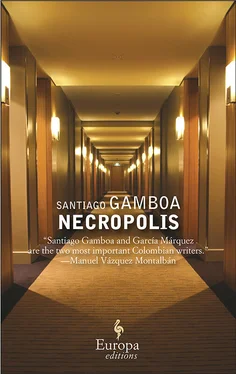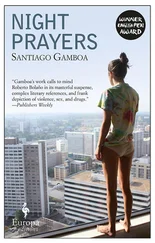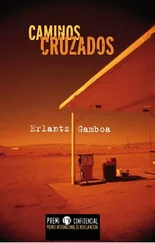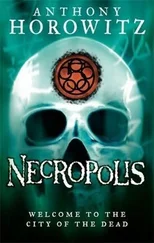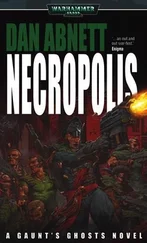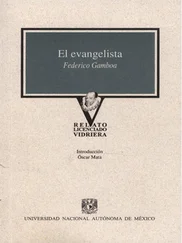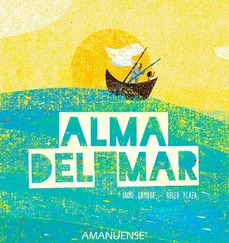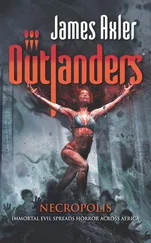José didn’t own up, he denied it, saying that these sums of money were not for him but for charitable works, that Walter could go out on the streets and see what he had done, everything was there, invested in young people and in reformed prostitutes who were worth more than that money. Walter wouldn’t listen to him anymore, he sat down on the floor and asked José to leave him alone. A week later the police arrived, doesn’t that seem strange to you?
I was about to speak, because I still had a lot of questions, but she raised her finger to her lips and said, that’s enough now, we’ve talked for a long time, I suggest you go back to Jerusalem and think about everything I’ve told you. In a couple of days I’ll get in touch with you and we’ll continue our talk. But I want you to know that I didn’t go to the morgue. The last thing I want is to see a dead body, let alone José Maturana’s. I saw him from a distance at that cocktail party, and left again immediately. Then I saw him during his talk. Actually I just heard him, because I was sitting at the back of the room with my eyes closed. It hurt me just to look at him, anyway I can’t go on, goodbye. She left the café and crossed the street without once turning back.
The highway to Jerusalem seemed shorter now, in spite of the fact that the army stopped us several times. The Jerusalem number plates helped Momo to get through, but he constantly had to give explanations and show his safe conduct. We soon arrived at the military checkpoint on Jaffa Road and passed the hillock that leads into the valley.
There again was the tortured face of the city.
On the horizon we saw the skeletons of buildings that had burned after the first explosions and were now black and covered in dust. Eviscerated apartment blocks, twisted girders, towers turned into huge torches, heaps of broken glass, soot-blackened windows like empty eye sockets. On the corners, mountains of garbage from which foul-smelling streams flowed and buzzards pecked in search of food.
The whole city was laid out before us, and Momo pointed it all out to me. There was the Jewish district of Mea Shearim, with its synagogues and its Hasidic population; there, Bekaa, which had previously been Arab; to the south, Ohel Moshe; the elegant Rehavia and Kiryat Shmuel, near the hotel, and farther out, Talpiot; then the Arab districts, Katamón, Beit Safafa, and East Jerusalem, the German, Greek, and American colonies, and in the middle, like a giant jellyfish run aground on a coral reef, the Old City, that much sought-after treasure.
All this, said Momo, is no more than the entrance to a place that can’t be seen from here but is down there, the Valley of Josaphat, where the trumpets will sound for the Last Judgment, because this city, basically, is made for death. Everyone’s death. That’s why it’s the great necropolis, the cemetery of East and West.
I looked with interest at the stumps, mutilations, and pustules of that capital still under siege, which seemed to keep reserves of strength in its centuries-old memory that might allow it to rise again. The sun was setting.
The sharp crack of a grenade broke the fantasy and Momo started the engine. Let’s get out of here, he said, and may God protect us.
It was after five in the afternoon by the time we got back to the hotel. As I crossed the lounge on the first floor, one of the organizers of the ICBM approached and said, my dear friend, are you all right, we missed you at the round table this morning, I hope you weren’t in any kind of accident? I looked at the board with the conference schedule and read, 11:00 A.M. Round table. On the manifold forms of remembering, evaluating, understanding, and transmitting a life. My name was on the list of speakers. How embarrassing, it had been at eleven in the morning.
I’m so sorry, I had some urgent business to attend to in Tel Aviv and got back late, but to tell the truth, I didn’t know about this, I forgot to look at the program before I left, you must forgive me, please add my name to any of the remaining round tables, I beg you, but he said, don’t worry, my friend, life is full of imponderables, we just have to carry on with the conference, we’ll wait for your next contribution, he said, adjusting his glasses, and added, I’m sure it’ll be worth the wait, in fact, I can tell you that there’s a great deal of expectation building up among the public and the specialized press.
I took my leave shamefacedly, how could I have forgotten something like that? Then I ran to my room, eager to get my encounter with Miss Jessica in Tel Aviv down on paper.
When I got to my room, I found a note from Marta saying, take a look at these papers, I’m going out with Amos, don’t wait up for me. It was the medical report on Maturana. I didn’t understand most of it, but a few things caught my eye: Kaposi’s sarcoma, pustules in the liver, pneumocystis carinii, fungus in the mouth and the wall of the esophagus, dying lymphocytes, presence of the HIV retrovirus in the ganglions, plus a series of figures I couldn’t make head or tail of. He had AIDS! I immediately went to the table and started writing.
The next day, the telephone jolted me out of my sleep, like an arm grabbing me by the neck and pulling me out of deep water. It was Rashid, and he was in the King David, he had come to hear Sabina Vedovelli and suggested we meet down in the bar. I told him to wait for me. I threw water on my face and walked to the elevators, but when I got downstairs I found that Rashid was not alone. He was with Kosztolányi, Supervielle, and the head of Tiberias, Ebenezer Lottmann.
When I arrived, the three men looked at me.
Rashid rose to greet me and said, I think you all know each other? I felt somewhat ill at ease. The only one who seemed pleased to see me was Kosztolányi, who said, my dear colleague, what a pleasure you can be with us, would you like a coffee? we were talking about the latest events. I assumed a surprised expression and asked, which events, exactly? Supervielle threw me a sardonic glance and said, which events? well, Maturana’s suicide is. . striking, wouldn’t you say? I’d go so far as to call it outlandish; perhaps the ICBM should suspend the scheduled sessions and host a panel with the title Interpretations and Variations on a Suicide, what do you think? and he added, in an irritable tone: everyone’s interest has shifted away from the lectures and debates because of this unfortunate event, and obviously a suicide deserves our attention, but. . isn’t it, when you get down to it, merely the story of a man reaching the limits of his contradictions? In France, nobody would hesitate to call that famous Ministry a cult, and of course, between ourselves, what they did would be considered a crime; both the pastor, may he rest in peace, and his guru, may he also rest in peace, if they were French would have been put behind bars and nobody would think of them as heroes. Anyway, sighed Supervielle, poor man, although I’m not sure his tragedy is worth the incineration of a conference like this.
As he spoke, Supervielle observed Lottmann out of the corner of his eye to see his reactions, but the publisher, who was apparently used to having his face scrutinized like that, did not move a single muscle. Then Kosztolányi said, of course, a conference of this kind, with international delegates and in a city like this, with all that it symbolizes, has enough going for it to sustain such a blow, and that’s what will happen, I don’t have the slightest doubt, in fact your talk, my dear Edgar, was an example of how the public’s interest did not fade at all, don’t you all agree?
Rashid and I nodded, but Lottmann still sat there, motionless and hieratic, until he raised his hand, moved it to his glass of mineral water, and said, what I think about the subject has more to do with my work as a publisher, I believe that if Maturana’s story can be well written, it would make for a very good book; anyone, however poor his instinct, would be able to recognize that and it’s a pity that the protagonist did away with himself so early, although his own final suicide is excellent, it gives the story an incomparable romantic aura, a perfect ending for a narrative on modern violence and the role of faith in social redemption, something very shocking and very contemporary, a strong, hard-edged urban narrative, almost a piece of narrative journalism tracing the lives of each of the characters up until the conference starts, and then, bang, the suicide, the mystery of why he took his own life and the endless questions this creates in the others, in those who remain on the side of life, and of course the different interpretations, and what if, instead of being a suicide, and this is just for the sake of argument, it turns out to have been a murder, then we would get into the territory of the noir novel, an extraordinary noir novel in which the same sociological elements would become the natural theater for a tragedy, the story of a solitary man who is redeemed by God and who in the end takes a secret to the grave to him, because somebody, who? has eliminated him to stop him divulging it, who could be the killer?
Читать дальше
